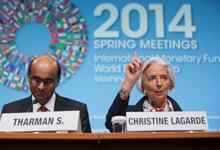
Typical street scene in Santa Ana, El Salvador. (Photo: iStock)
IMF Survey : IMF Policy-Steering Body Aims for Balanced, Job-Rich Global Economy
April 12, 2014
- Global economy strengthening but growth subpar and uneven
- World finance chiefs pledge to work together to spur recovery
- Structural reforms key to creating jobs, unleashing sustainable growth
With the global economy strengthening, the International Monetary and Financial Committee (IMFC) stressed that countries should shift their focus from the short term to the medium term, with special emphasis on carrying out structural reforms that will support sustainable, balanced, and job-rich growth.

IMFC’s Shanmugaratnam (l), with IMF’s Lagarde: IMFC called on countries to shift focus to medium term, with emphasis on structural reforms (photo: IMF)
IMF-World Bank Spring Meetings
“We need a new balance in policies that meets the needs of a new phase of the economic recovery globally,” said Singapore Finance Minister Tharman Shanmugaratnam, who chaired the twenty-ninth meeting of the IMFC.
“This doesn’t mean a sudden withdrawal of macroeconomic policies—especially monetary policies—that support the recovery. But it does mean much greater focus on structural reforms,” Tharman said.
Old and new risks
Tharman highlighted a few key areas that merit greater attention, according to the IMFC.
In addition to the need for structural reforms—such as repairing balance sheets, strengthening banking systems, and improving the functioning of labor markets—he cited a few key risks to the global economy. Risks to financial stability—not only legacy risks but also new ones—were of particular concern, such as an increase in corporate debt in some countries that is not matched by growth in investment.
He also noted concern about the continued risk of volatility in capital flows to emerging markets. This heightened risk partly reflects a change in the structure of global finance—there is not just a higher volume of capital flows but also a change in the composition of these flows.
Geopolitical risks also warrant vigilance, Tharman said, noting that the IMF plays an important role in helping stabilize geopolitical crises and de-escalate the associated economic risks.
Not just more, but also better growth
IMF Managing Director Christine Lagarde emphasized the need to sustain the global recovery through the pursuit of better, more inclusive, and more balanced growth.
She noted the IMFC’s strong endorsement of her Global Policy Agenda, which provides encouragement for the IMF to move forward with what it can offer the global community to promote growth.
The IMF’s work on inequality supports the quest for inclusive growth, Lagarde said. She added that higher quality growth—where such factors as climate change and environmental degradation are taken into account—is critically important. This is also an area of focus for the IMF’s work.
“We’ve worked on the removal of energy subsidies; we will soon be publishing work on the setting of the right price for energy,” Lagarde noted. For all issues of macroeconomic relevance, she said, the IMF will provide analysis and work with its member countries to help them pursue their chosen growth path.
IMF governance reform
Both Tharman and Lagarde expressed regret for the continued delay in advancing the IMF quota and governance reforms agreed in 2010. “These reforms to the Fund are not just institutional reforms, they’re reforms that will enable us to have a safer and better world, because the Fund provides critical public goods,” Tharman said.
At the G-20 press conference on April 11, Tharman said that there was “significant goodwill” among ministers to find a way forward on the quota issue and that there was consensus on the absolute importance of maintaining a strong and adequately resourced IMF.
“We have a way forward,” said Lagarde, noting that the IMFC set an end-2014 deadline for ratification of the 2010 reforms. If this deadline is not met, the IMF will develop options for next steps.
Upcoming conferences
Lagarde noted that work in low-income countries continues to be a priority for the IMF. Together with the government of Mozambique, the institution will hold a conference in Maputo on May 29-30 to take stock of Africa’s strong economic performance, its increased resilience to shocks, and the key ongoing economic policy challenges. The event is intended to follow up on the 2009 Tanzania Conference, which helped galvanize international support for Africa after the 2008 financial crisis.
The IMF is also actively involved with the Arab countries in transition, Lagarde said, adding that three countries in the region—Morocco, Tunisia, and Jordan—are currently engaged in an IMF-supported program. The institution is organizing a conference on May 11-12 in Amman, Jordan, to promote regional dialogue on an economic vision for the Arab countries in transition. The conference is cosponsored by the government of Jordan and the Arab Fund for Economic and Social Development.


